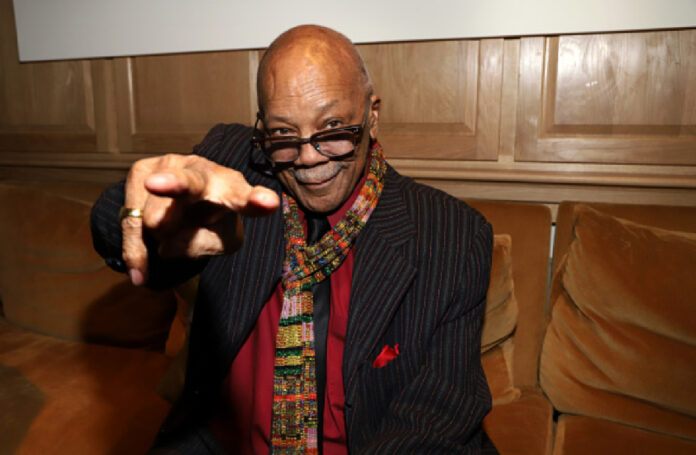
The world lost an unmatched music pioneer with the passing of Quincy Jones, who died at 91 on Sunday night, surrounded by family at his home in Los Angeles’ Bel Air.
The multi-talented visionary, who transformed the music industry, working with icons like Michael Jackson, Frank Sinatra, Ray Charles, and countless others, died of pancreatic cancer.
His legacy is woven into the very fabric of American music, from producing Jackson’s groundbreaking “Thriller” album to scoring for film and television.
A giant among giants, Quincy Jones was a beacon of creativity, a trailblazer, and a mentor whose influence remains deeply rooted across generations and genres.
“Tonight, with full but broken hearts, we must share the news of our father and brother Quincy Jones’ passing,” the Jones family stated. “And although this is an incredible loss for our family, we celebrate the great life that he lived and know there will never be another like him.”
From Humble Beginnings to Hollywood Heights
Born on the South Side of Chicago, Jones rose above early struggles to become a music titan and one of the first Black executives to make waves in Hollywood.
Raised amid hardship and violence, Jones found solace in music—a force that would reshape his future.
By his teens, he was already playing trumpet alongside luminaries like Billie Holiday and befriending a young Ray Charles.
Soon after, he was touring with Lionel Hampton and developing a unique voice that would propel him into the heart of the music industry.
Quincy’s early career was a testament to his resilience and versatility.
From jazz clubs to Hollywood studios, he created timeless soundscapes that helped define American culture.
Known for working with legends like Sinatra and Ella Fitzgerald, Jones also scored music for iconic films such as Roots and In the Heat of the Night.
His unbreakable spirit and unyielding dedication allowed him to cross racial barriers, eventually making history as one of the first Black vice presidents at Mercury Records and as the Academy Awards’ first Black musical director in 1971.
The Power of Partnership: Michael Jackson & Quincy Jones
Jones’ collaborations with Michael Jackson represent one of music history’s most impactful partnerships.
Together, they crafted Off the Wall, Thriller, and Bad, blending genres to create an electrifying global sound that elevated Jackson from a pop star to the “King of Pop.”
Thriller, Jones’ magnum opus, sold over 20 million copies in its first year, with unforgettable tracks like “Billie Jean,” “Beat It,” and the chilling title track.
His imaginative direction brought Eddie Van Halen’s guitar riffs and Vincent Price’s haunting narration to the record, helping it become the best-selling album of all time.
“If an album doesn’t do well, everyone says ‘it was the producer’s fault,’” Jones once reflected. “So if it does well, it should be your ‘fault,’ too.”
His dedication to perfection set a high bar for music production, and his intuition for the alchemy of sound became a touchstone for countless artists and producers worldwide.
An Artist, Mentor & Cultural Architect
Jones’ reach extended far beyond music.
He was a facilitator of star-making moments, from producing The Color Purple, which introduced Oprah Winfrey and Whoopi Goldberg to film audiences, to helping launch Will Smith‘s career with “The Fresh Prince of Bel-Air“.
His boundless curiosity and knack for innovation led him to launch Vibe magazine, co-found Qwest Broadcasting, and spearhead initiatives that fostered inclusivity in the arts.
His philanthropy and activism, particularly for children and HIV/AIDS causes, demonstrated his commitment to using fame for a greater good.
Describing himself as a “dog” when it came to love, Quincy was candid about his life’s pleasures and struggles, including a near-fatal brain aneurysm in 1974 and the emotional toll after The Color Purple was snubbed at the Oscars.
Though he never won a competitive Oscar, he was showered with accolades, including 28 Grammys, an Emmy, and two honorary Academy Awards.
His autobiography “Q” holds an 18-page list of his achievements, underscoring his extraordinary contributions to music and culture.
A Lasting Legacy
Quincy Jones’ influence is eternal. His unique synthesis of rhythm, jazz, R&B, and pop inspired generations, with stars from Stevie Wonder to Tupac Shakur drawing from his work.
His collaborations, whether with jazz titans or hip-hop icons, showcased his adaptability and thirst for innovation. Jones’ daughter Rashida Jones captured his vibrant spirit in her 2018 documentary, honoring her father’s journey in the industry and in life.
Jones’ profound impact will endure, immortalized in his music, his mentorship, and his unwavering belief in the power of creativity to shape the world.
He leaves behind his children—Rashida, Jolie, Rachel, Martina, Kidada, Kenya, and Quincy III—along with siblings Richard, Theresa, and Margie, who carry forward his legacy.
Quincy Jones’ story is one of a soul ever restless, a mind forever curious, and a spirit that enriched the world with melody and meaning.
His life, as he once described it, was “like a dream… in Technicolor, with full Dolby sound.”
And to his fans around the world, his legacy remains an everlasting soundtrack.
My sincerest condolences to the Jones family and all who knew and cherished Mr. Quincy Jones.
Stay connected with us for more updates on the latest in Entertainment and Celebrity News. Follow us on Facebook, Instagram, and Twitter. Subscribe to receive our daily newsletter.












